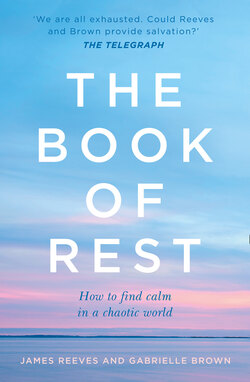Читать книгу The Book of Rest - James Reeves - Страница 14
Are some people better at resting than others?
ОглавлениеBecause rest is a matter of doing nothing, anyone can rest as long as they are willing to let go of the idea that they must ‘do’ something to make it happen, or that they must somehow make themselves more ‘peaceful’. People who have been practising yoga, meditation or mindfulness for a number of years have not somehow banked any more ‘inner peace’ than Mrs Jones whose preferred relaxation technique is hitting the local bingo hall, they simply may know how to access it more readily. They are no more (or less) at peace at their core than you are, even as you read this and perhaps even believe that you’ve never been at rest in your life.
Those of us who actively engage in formal relaxation techniques (or whatever you want to call them) are simply those of us who sought out or discovered a particular process that helped us to stop, or that helped us to believe that all we had to do was stop. Once we experienced the benefits of stopping, and then falling into that stillness, we continued to stop and do nothing as often as life allowed.
A popular assumption that we regularly come across is that because we teach yoga we are inherently calm, whereas the opposite is just as (or perhaps more) likely to be true. Look at any yoga teacher’s website and read through their bio and you’ll typically see a story that begins with a person who, at a particularly low and stressful point in their lives, when all else failed, found yoga to be the only thing that helped bring them back to a place of physical and mental OK-ness. You rarely read a bio that speaks of a blissful childhood, harmonious adolescence, super-chilled career path and a sudden realisation of, ‘I really ought to share my naturally easy-going demeanour with the world.’
We ‘teachers of rest’ were at one time likely to have been extremely restless – perhaps even addicted to restlessness – and then, by various routes and accidental happenings, we discovered our innate restfulness.
You might find the techniques and processes in this book help lead you to the door of your innate stillness, or you might find you can feel your way towards it more instinctively. The rested self doesn’t care how you find it. All practices are a path to rest, but they are not rest in themselves (and although there are many paths to rest, none of them is necessary to you feeling rested).
We are aware that we are in danger of shooting ourselves in the foot by declaring that you do not need to understand complicated yoga, meditation or mindfulness techniques to feel rested. Although we earn a living helping people to feel rested, much of our work is about helping shake off the idea that we must study, practise, understand, master or refine anything to find peace within ourselves. Ours is a business that can sometimes seem mysterious and indeed mystic – full of methods and teachings that only a few special gurus have mastered and are able to share. While we know that there are some beings out there with certainly unusual and perhaps even magical abilities, they do not somehow bestow upon their followers a more special kind of peace than you are capable of finding by other means – either with somebody’s help, or by simply sitting alone by yourself.
We don’t mean to pitch The Wizard of Oz as a life handbook, but the story’s message is relevant to the above point. All the while Dorothy seeks a guru (the Wizard) to show her the way home, she already has everything she needs about her person to find the way home herself. Indeed, the Wizard is an illusion, or at least a human no different to Dorothy. However, that’s not to say the Wizard didn’t help Dorothy uncover this fact. She first had to see that her beliefs were nothing more than an illusion before she could tap (three times) into her own inner knowing.
